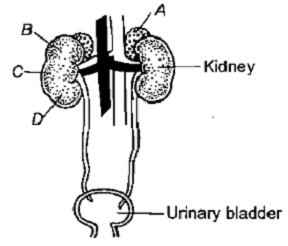Atrial natriuretic hormone (ANH) will promote a(n) ________ in the excretion of sodium and water; thus ________ blood volume and blood pressure.
1. decrease, decreasing
2. decrease; increasing
3. increase, decreasing
4. increase, increasing
Match each item in Column I with one item in Column II and chose your answer from the codes given below:
|
Column I (animal) |
Column II (excretory product) |
|
I. Aquatic turtles II. Crocodiles III. Humans |
1. ammonia and urea 2. urea and CO2 3. ammonia and uric acid |
Codes:
I II III
1. 1 2 3
2. 2 3 1
3. 2 1 3
4. 1 3 2
Removal of proximal convoluted tubule from the nephron will result in
(1) more diluted urine
(2) more concentrated urine
(3) no change in quality and quantity of urine
(4) no urine formation
Which of the following statements is correct?
1. The ascending limb of loop of Henle is impermeable to water
2. The descending limb of loop of Henle is impermeable to water
3. The ascending limb of loop of Henle is permeable to water
4. The descending limb of loop of Henle is permeable to electrolytes
The part of nephron involved in conditional reabsorption of sodium is
1. distal convoluted tubule
2. Proximal convoluted tubule
3. Bowman's capsule
4. descending limb of Henle's loop
In mammals, which blood vessel would normally carry largest amount of urea?
(1) Dorsal Aorta
(2) Hepatic Vein
(3) Hepatic Portal vein
(4) Renal vein
Human urine is usually acidic because
1. the sodium transporter exchanges one hydrogen ion for each sodium ion, in peritubular
capillaries
2. excreted plasma proteins are' acidic
3. potassium and sodium exchange generates acidity
4. hydrogen ions are actively secreted into the filtrate
Which of the following does not favor the formation of large quantities of dilute urine?
1. Alcohol
2. Caffeine
3. Renin
4. Atrial-natriuretic factor
Which of the following causes an increase in sodium reabsorption in distal convoluted
tubule?
1. Increase in aldosterone levels
2. Increase in antidiuretic hormone levels
3. Decrease in aldosterone levels
4. Decrease in antidiuretic hormone levels
Figure shows human urinary system with structures labelled A to D. Select option,
which correctly identifies them and gives their characterstics and/of functions.

1. A-adrenal gland located at the anterior part of kidney. Secrete catecholamines,
which stiumate glycogen breakdown
2. B-pelvis broad funnel shaped space inner to hilum, directly connected to loops of
Henle
3. C-mediulla-inner zone of kidney and contains complete nephrons
4. D-cortex-outer part of kidney and do not contain any part of neohrons






